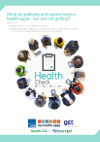 Despite the huge and obvious potential of health apps to support patient self-care and reduce the drain on healthcare systems - their use has yet to move into mainstream medicine and public health programmes aimed at disease prevention. The lack of user involvement is one of the major reasons why health apps have failed to deliver thus far: what do patients and carers need in health apps - but are not getting? And how can developers respond and deliver better apps accordingly? These are the two key questions tackled in the latest analysis of the findings of a global survey and multi-stakeholder workshop, published by PatientView, in conjunction with Health 2.0 and TICBioMed, co-ordinator of the EU-funded GET project.
Despite the huge and obvious potential of health apps to support patient self-care and reduce the drain on healthcare systems - their use has yet to move into mainstream medicine and public health programmes aimed at disease prevention. The lack of user involvement is one of the major reasons why health apps have failed to deliver thus far: what do patients and carers need in health apps - but are not getting? And how can developers respond and deliver better apps accordingly? These are the two key questions tackled in the latest analysis of the findings of a global survey and multi-stakeholder workshop, published by PatientView, in conjunction with Health 2.0 and TICBioMed, co-ordinator of the EU-funded GET project.
The results, presented in a new white paper, What do patients and carers need in health apps - but are not getting?, analyse the views of 1,130 patient and carer groups worldwide. The needs and challenges raised were then discussed in a multi-stakeholder meeting held to help define concepts for new apps that address patient and carer unmet real needs.
Download from eHealthNews.eu: What Do Patients and Carers Need in Health Apps - but Are Not Getting? (.pdf, 4.849 KB).
About PatientView
A UK-based research, publishing and consultancy group, PatientView has been collecting and analysing the perspectives of thousands of patients on their healthcare since 2000. It now has the capacity to reach out to 120,000 patient organisations worldwide, covering over 1,000 specialities. PatientView launched the myhealthapps.net website in November 2013 to provide an independent portal for patients, carers and health-conscious consumers to find apps that have been tried, tested and trusted by patient and health consumer groups.
About TICBioMed
TICBioMed is a cooperative cluster of companies, universities, healthcare providers and public institutions that work together to foster technological innovation in healthcare (eHealth). The association participates in the European projects GET, READi for Health and FICHe, and is the organiser of the EU SME eHealth Competition.
About Health 2.0
Since 2007 Health 2.0 Conferences have been the leading showcase of the cutting-edge technologies transforming health and healthcare. Health 2.0 promotes, showcases and catalyses new technologies in healthcare. We do this through a worldwide series of conferences, code-a-thons, prize challenges, and more. We also have the leading market intelligence on new health technology companies. Health 2.0 is a partner of the European project GET.
About the GET project
The European project GET delivers services to eHealth SMEs and entrepreneurs in order to boost their growth and move them to the next level of competitiveness. One of the delivered services is the systematic identification of ´unmet needs´ in Health. The objective is to support digital entrepreneurs to spot opportunities following a demand-driven approach (from the need to the solution) avoiding the technology push. The project also provides support regarding business modelling, internationalisation and private funding. This project has received funding from the European Union’s 7th Framework Programme for Research, technological development and demonstration under grant agreement no 611709.